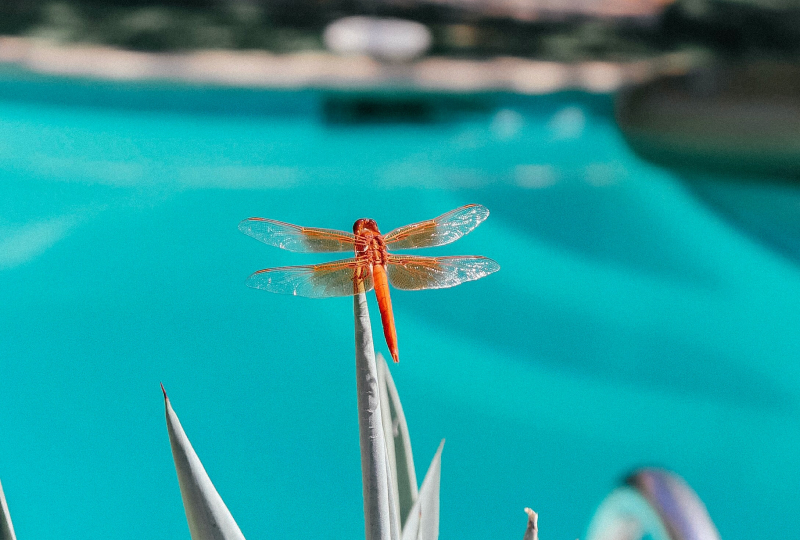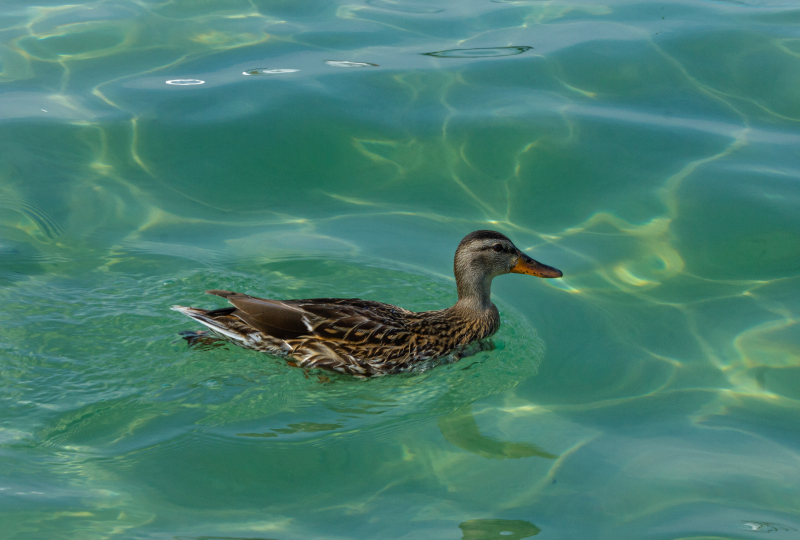
Wildlife in the Pool
When the conditions are right, your winterized pool, heated pool, and even non-heated pool can become an ideal residence for certain critters. Depending on where you live, these can include insects, water bugs, ducks, rodents, and animals.
How To Keep Insects Out Of The Pool
1. Circulate Your Pool Water
Stagnant water attracts insects like mosquitoes, so run your pool pump for at least 3-4 hours daily. Circulating your pool water can help prevent mosquitoes from landing or laying eggs in your pool water.
2. Balance Your Pool Water
When your water lacks the proper chemicals and chlorine isn’t acting effectively, you will naturally attract more bugs to your pool water.
Maintaining the appropriate chlorine levels in your pool can interfere with the growth of bug larvae while keeping your pool clean.

3. Eliminate Pool Algae
Algae acts as a significant contributor to pool insects. Many bugs lay eggs in algae, and some feed on algae. Maintain correct pH levels and shock your pool when necessary to keep it algae-free.
4. Use a Swimming Pool Cover
Besides heating your pool, solar covers can help create a barrier between your pool water and bugs. Place the cover over your pool when it’s not in use, and remove the bugs from the surface before taking the cover off your pool.
Weekly, drain any accumulated water from the cover before it has the opportunity to become stagnant. If your cover gets extra grimy, complete a thorough cleaning.
5. Keep the Pool Area Clean
After hosting a large pool party, ensure you remove and properly dispose of any leftover food from the pool area. Otherwise, your pool area becomes attractive to bugs, and you may start finding bugs in the pool water.
6. Improve Your Landscaping
Rosemary, garlic, onions, and mint are all examples of what you can include in your pool’s landscaping to deter bugs. The smell that wafts from these herbs and vegetables is a natural deterrent to keep bugs away.
7. Install Birdfeeders
Attract more birds – bugs’ predators – to your pool area by installing a few bird feeders. Many birds, such as bluebirds, cardinals, nuthatches, and orioles, have a diet containing beetles, stink bugs, grasshoppers, snails, moths, and earwigs.
8. Install a Screen
Screening your pool may be best if you live in a tropical environment with a severe bug problem. Constructed out of steel and covered with intricate netting for walls, screened enclosures surround your entire swimming pool and/or deck area.
9. Use a Surfactant
Surfactants are special chemicals that disrupt the surface tension of the pool water, creating an uncomfortable swimming environment for insects like water spiders.
10. Use Insect Repellents
Bug misting systems spray bug repellent on an intermittent or motion-activated basis. Although effective, space is needed to store the system, creating an eyesore in your pool area.
Bug traps are easy to use and have an appealing scent to attract insects before poisoning, trapping, or shocking them. Citronella candles are another helpful product that helps keep bugs away.
How To Get Rid Of Water Bugs In Pools
1. Maintain Your Yard
Two types of water bugs in pool water can appear – water boatmen bugs and backswimmers. Both are attracted to wet areas, so minimizing the area surrounding your pool of standing water can help keep these pool bugs away.
Also, remove stagnant bird baths and clean up any areas with standing water to help prevent swimming bugs in pool water.
2. Maintain Your Pool
Keep your pool as clean as possible by skimming it daily to remove dead bugs and algae spores. Ensure algae – which attracts both types of water bugs in pool water – doesn’t develop in your pool by maintaining proper chlorine levels and shocking your pool regularly.
How To Keep Ducks Out Of Pools
1. Maintain Your Pool
Like insects, ducks are more attracted to dirty water. When your pool lacks proper chlorine and contains floating debris, it’s more likely to be mistaken as pond water and entice ducks. An automatic pool cleaner helps clean your pool surfaces, and the sound can easily scare ducks away.
The area around your pool should also be clean and tidy. If you’re regularly finding ducks in your pool, consider removing bird feeders and flowers – or anything seen as attractive to wildlife.
2. Use a Decoy
Placing certain inflatable animal toys (such as alligators, snakes, and dolphins) or plastic owls around the pool can help scare ducks off – at least for a while. Eventually, the ducks may learn that the plastic decoys are not a real threat.
You can also purchase or create balloons that float atop the water and look like large predator eyes.
3. Install a Sprinkler
Motion-activated sprinklers will quickly shoot short bursts of water when movement is detected. Specific sprinklers can reach up to 100 feet from the sprinkler, catching birds off-guard and scaring them away.
4. Install Bird Netting
Bird netting prevents ducks from landing easily. Usually, once a bird comes into contact with the barrier, it will never return.
Bird netting is reusable, easier to install than fishing lines, and available in sizes up to 100’ x 100’.
How To Keep Mice, Rats, And Other Rodents Out Of The Pool
1. Use Natural Remedies
Sprinkling mothballs around your pool area, using a hardwire cloth over pool equipment instead of a tarp, and filling any cracks or holes with steel wool can help deter rodents such as rats, chipmunks, and mice. Scattering rubber snakes around your pool area can also scare them away.
2. Use a Repellent
There are both chemical and homemade repellents that can act as a deterrent to rodents. For example, snakes are likely to stay away from white vinegar and ammonia, whereas cayenne pepper can be sprinkled around your pool to deter mice, squirrels, and rats.
Apply the repellent regularly, especially after heavy rainfall.

How To Keep Small Animals Out Of The Pool
Install an Automatic Sprinkler
Unexpectedly spraying small animals with a short burst of water can scare them away from entering your pool. Sprinkler systems with infrared sensors can detect the movement of animals and spray them when necessary.
